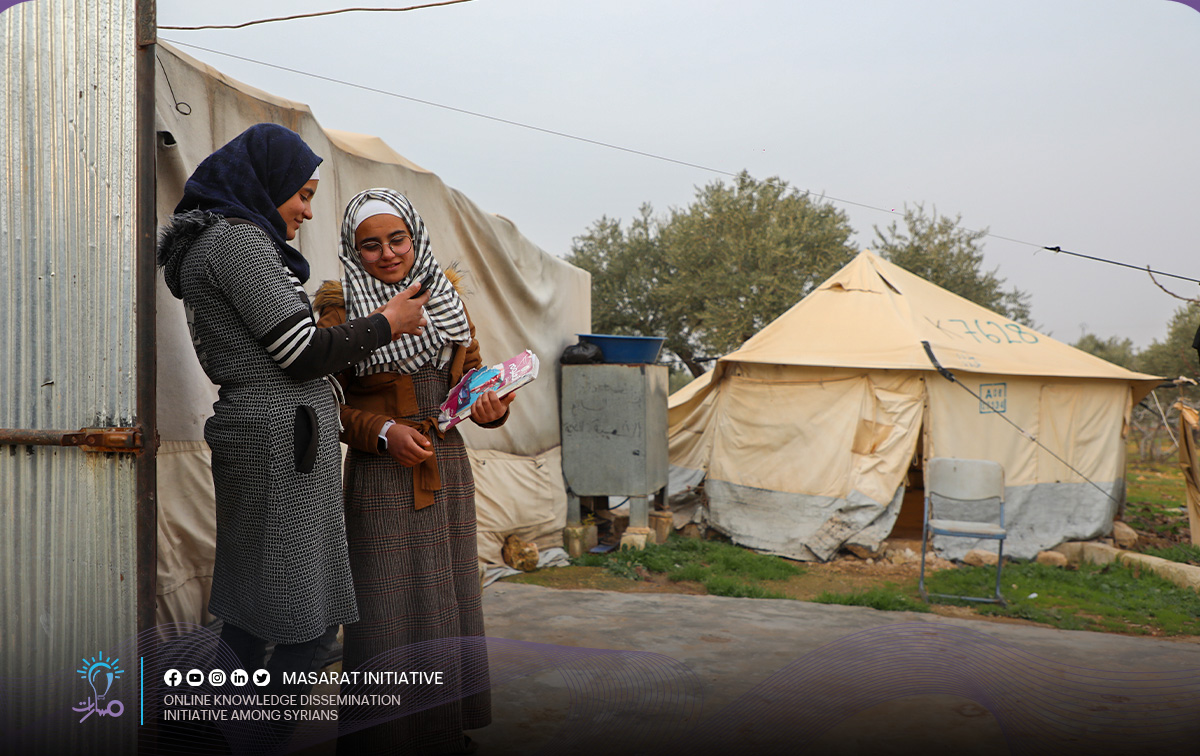Zakat is the growing wealth that exceeds a Muslim’s needs; it refers to the money that must be given to the poor. Its importance is highlighted in many places in the Quran, often mentioned alongside prayer: “And establish prayer and give Zakat.”
In this article, we explain the importance of Zakat on real estate, its types, and the key conditions that must be met for paying Zakat on owned or inherited properties. We conclude by introducing the Masarat Initiative and its free educational services for students in Syria.
? What is Real Estate Zakat and Its Conditions
Zakat on real estate has many details, with specific conditions for each case:
- No Zakat is due on property owned and occupied by the Muslim, as it does not generate income or profit.
- No Zakat is due on rental property itself, but on the rental income. If the rental income reaches the Nisab (minimum amount) alone or combined with other money, Zakat is due.
- Zakat is due on property owned with the intention of selling for profit when it reaches the Nisab by itself or combined with other Zakatable assets. The property’s value is assessed based on the market price when Zakat becomes due, i.e., after a lunar year.
Types of Real Estate Zakat
Inherited Property Zakat
Most scholars agree that no Zakat is due on inherited property, even if the heir intends to trade it, because the general condition for Zakat obligation is that the Muslim acquires the property through a purchase contract.
Others justify the non-obligation of Zakat on inherited property because it comes into the heir’s possession involuntarily, so no Zakat is due.
Zakat on Trade Goods in Real Estate
Property bought with the intention of sale and profit is considered a trade good subject to Zakat when it reaches the Nisab alone or combined with other money, and a lunar year has passed.
Zakat is paid based on its market value at the end of the lunar year, not the purchase price. The exact value of the property is determined at the end of the year, and 2.5% of its value is paid.
Zakat on Undivided Inherited Properties
Scholars state that no Zakat is due on inherited property unless intended for trade. After a year of ownership, if trade is intended, Zakat is calculated from the time of the trade intention, or Zakat is paid once after the sale.
Zakat on Idle or Abandoned Properties
For idle properties, the majority of scholars believe Zakat is due as long as the property has market value and is salable, provided the intention is to sell, not rent. If intended for rent, Zakat is due on the rental income.
Zakat on Rental Properties
How to Calculate Zakat on Rental Property
Property bought with the intention of renting out has no Zakat due on it, but Zakat is due on the rental income.
If the rental income reaches the Nisab after a lunar year, or combined with other Zakatable assets, 2.5% of the income is paid as Zakat.
Zakat Ruling on Rental Property
No Zakat is due on rental property itself, but on its rental income after it reaches the Nisab and a lunar year has passed. If the income is spent on basic needs before the year ends, no Zakat is due, as it does not meet the essential conditions of Nisab and the lunar year.
Zakat on Mortgaged, Stagnant, and Installment Properties
Mortgaged Property
Zakat is due on mortgaged property if the intention at purchase was trade. Sheikh Ibn Baz stated: “If you intend to trade and it is mortgaged, you must pay Zakat on it. If it is mortgaged and not intended for trade but for settling a debt, no Zakat is due.”
Stagnant Property
Zakat is due on stagnant property if it has market value when sold, as Zakat on trade goods is based on growth potential, whether profit or loss. Thus, Zakat on stagnant property is due if it has real market value.
Installment Property
Zakat is due on installment properties if they meet the conditions of Zakat:
- Bought with the intention of trade.
- The value reaches the Nisab alone or combined with other Zakatable assets.
- A lunar year has passed since the money used for purchase was owned.
For properties bought with the intention of trade, they are considered trade goods, and Zakat is due on them. The actual property value at the end of the year is assessed, and 2.5% is paid after deducting any outstanding installment amounts.
Zakat on Investment and Trade Properties
Zakat on Properties Owned for Trade : Property intended for trade is subject to Zakat according to all schools of thought. Trade means profit from the property. Sheikh Al-Mardaawi stated: “The intention of trade is to seek profit through compensation.”
The property’s value is assessed annually from the date of purchase, and Zakat is calculated based on its value on the Zakat due date.
Zakat on Residential, Listed for Sale, and Installment Properties
If the property is a personal residence, no Zakat is due. If it is a trade good, meaning bought for resale at a profit, Zakat is due on its value when it reaches the Nisab. The value is assessed annually based on the market price on the Zakat due date.
Property Sold in Installments
If the property is sold in installments and the original intention was trade, Zakat is due. The full property value is considered for Zakat, as installment payments are debt and do not exempt Zakat. Zakat is paid based on the market value on the Zakat due date.
Zakat on Under Construction and Developing Properties
For under-construction properties, the Maliki school states that Zakat is due only once, even if construction takes years. However, the majority of scholars believe the property’s value should be assessed annually based on the market price, and Zakat is paid accordingly. If unsure of the property’s value, Zakat can be paid based on the capital.
Zakat Al-mal on Investment Properties
If the investment is intended for trade, Zakat is due, as it is considered a trade good. If the intention is to save money, no Zakat is due. If the intention is mixed (personal use and trade), Zakat is due if the primary intention is profit.
Zakat on Property Purchased for Ownership
Zakat is not due on property intended solely for ownership without future sale and profit. However, Zakat is due on rental income if it reaches the Nisab alone or combined with other money.
Sheikh Ibn Uthaymeen stated: “If a person buys land with the intention of profit, Zakat is due, as it is considered trade. If the intention is not profit but building for rental or personal use, no Zakat is due.”
Masarat Initiative for Education and Vocational Training in Syria
Refugee and displaced communities live under harsh conditions, making access to quality education a significant challenge. Lack of basic resources hinders their educational dreams, but with the right support, we can change this reality.
By donating your Zakat, you contribute to igniting the flame of knowledge in the hearts of refugee, displaced, orphaned, and special needs children. This contribution is a beacon of hope that opens the doors to their future.
Your donation today is a continuous charity for you, providing comprehensive knowledge services that aim to build an empowered individual in society by equipping them with educational tools through school education, student activities, academic advising, vocational training, psychological, and technical support.
Your donation today is an opportunity to transfer knowledge to those who need it most.









